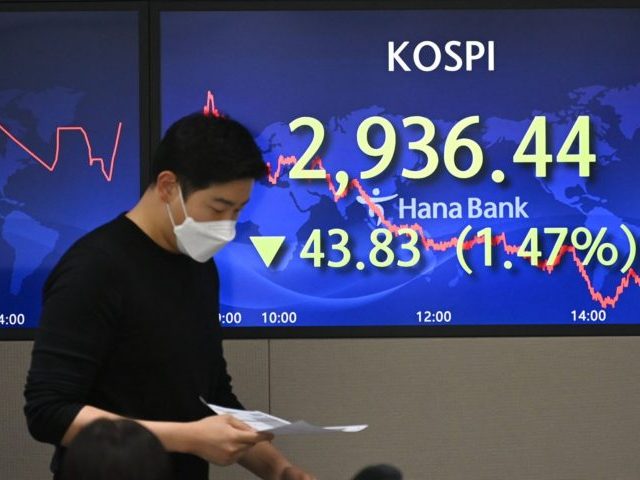U.S. stock markets opened sharply lower Friday morning as investors grappled with the fears of a new Covid variant found in South Africa but now spreading to Asia and Europe.
The Dow Jones Industrial Average fell by as much as 1000 points, or around 2.8 percent, after the opening bell. By the early holiday close, the Dow was down by 905 points, or 2.53 percent. The S&P 500 tumbled 2.3 percent and the Nasdaq Composite slipped by 2.2 percent. The small-cap Russell 2000 sank nearly 3.7 percent.
Oil plunged in the U.S. and around the world. West Texas Intermediate, the U.S. benchmark, fell more than 12.6 percent. Brent Crude, the global standard, fell 11.3 percent. Wholesale gasoline fell 12.2 percent.
The travel sector was particularly hard hit. Shares of Carnival Corp, which operates Carnival Cruiselines, dropped by around 11 percent and Norwegian Cruiselines shares fell 11.3.6 percent. United Airlines shares were off by 9.57 percent, American Airlines fell 8.79 percent, and Southwest Airlines sank 4.32 percent.
The worst performing sector of the day was energy, where stocks fell 4 percent. Financial dropped 3.27 percent. Industrials were off 2.73 percent. Consumer discretionary fell 2.64 percent. Information technology dropped 2.6 percent and real estate was off 2.69 percent. Health care was the best performing sector, declining just 0.45 percent with gains in biotechnology and pharmaceuticals.
Shares of Moderna jumped 20.57 percent. Shares of Pfizer rose 6.1 percent to a 52 week high.
Treasuries were in high demand as investors sought shelter in safe assets. The yield on the 10-year Treasury fell to 1.48 percent. Yields were down on government bonds in Germany, Japan, and the U.K. Yields move the in the opposite direction of prices, so a falling yield indicates rising investor demand.
All around the world, stocks fell in a broad sell-off that spread from Asia and Australia to Europe.
London’s benchmark fell 3.6 percent. Frankfurt’s DAX dropped 4.2 percent. In Paris, the major index fell 4.7 percent.
Japan’s Nikkei fell 2.53 percent. Hong Kong’s Hang Seng index tumbled 2.67 percent. Korea’s market sank 1.47 percent.
China’s stock market, meanwhile, fell by only 0.56 percent. Unlike many markets around the world, China’s stocks have not had a strong year. Stocks have bounced up and down throughout the year and the Shanghai index is up just 2.62 percent this year and 5.77 percent from a year ago. By contrast, the Dow is up 13.74 percent year-to-date and 16.53 percent compared with November of 2020.
Some European countries already tightened anti-virus controls this week after their own case numbers spiked. Austria imposed a 10-day lockdown, while Italy restricted activity by unvaccinated people. Americans were advised by their government to avoid Germany and Denmark.
The 27-nation EU proposed the travel suspension to member governments after South Africa said the variant was spreading in its most populous province. Britain banned flights from South Africa and five nearby countries.
“Investors are likely to shoot first and ask questions later until more is known,” Jeffrey Halley of Oanda said in a report. That was evident from the action in the bond market, where the yield on the 10-year U.S. Treasury note fell to 1.54 percent from 1.64 percent on Wednesday. The bond market was closed Thursday in the U.S. for Thanksgiving.
In midday trading, the FTSE in London fell to 7,099.69 and the DAX in Frankfurt lost 3.1 percent to 15,429.26. The CAC in Paris plunged 3.8 percent to 6,805.72.
On Wall Street, the future for the benchmark S&P 500 future lost 1.7 percent and the futures for the Nasdaq slipped 1 percent. U.S. markets were closed Thursday and are due to reopen Friday for a shortened trading session.
In Asia, the Shanghai Composite Index lost 0.6% to 3,564.09 and the Nikkei 225 in Tokyo declined to 28,751.62. The Hang Seng in Hong Kong tumbled 2.7 percent to 24,080.52.
Investors already were more cautious after Federal Reserve officials said in notes from their October meeting released this week they foresaw the possibility of responding to higher inflation by raising rates sooner than previously planned.
Investors worry central bankers might feel pressure to withdraw stimulus earlier than planned due to stronger-than-expected inflation. The Fed said earlier it foresaw keeping rates low until late next year.
Financial markets had been encouraged by strong U.S. corporate earnings and signs the global economy was rebounding from last year’s history-making decline in activity due to the pandemic. Stock prices have been boosted by easy credit and other measures rolled out by the Fed and other central banks.
—The Associated Press contributed to this report.

COMMENTS
Please let us know if you're having issues with commenting.